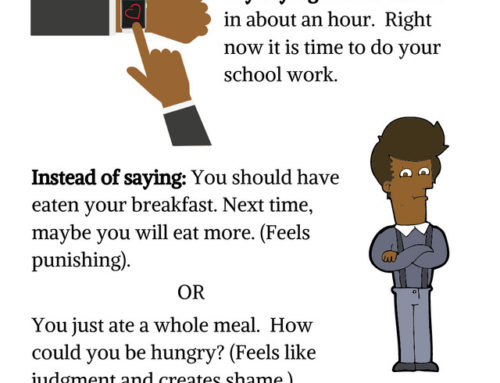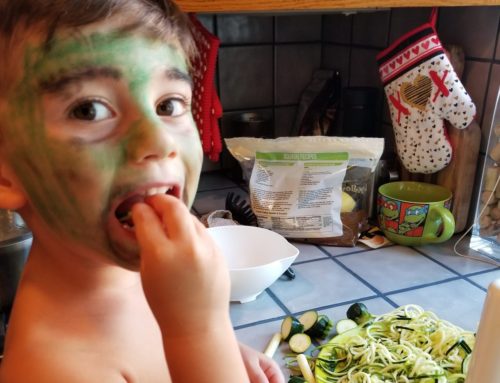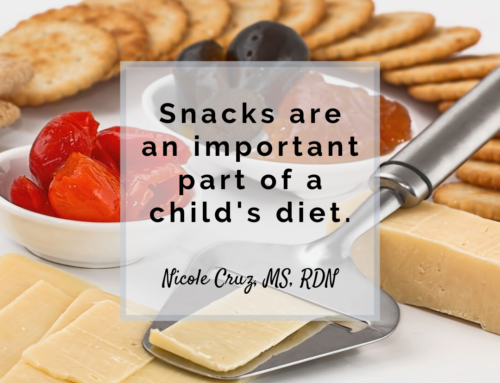For so many parents it feels confusing to know how to raise an intuitive eater.
“If we gave him that bag, he would eat the whole thing!” I recently heard a friend of mine say about his kiddo when he saw my six-year-old take the bag of Doritos. He then told his child he had to eat his lunch first if he wanted a chip. This might not seem like a bad idea. In fact, it sounds healthy. Eat some nutrient-dense foods and then you can have a little bit of “junk food”, kind of like the 80/20 rule. And while I don’t normally give my kids a bag of Doritos to walk around with, we were camping, and he grabbed it. And it honestly just wasn’t a big deal, because I am raising him to be an intuitive eater who trusts himself with food.

How do I raise an intuitive eater?
It is essential to give children the opportunity to make food decisions and learn from them without judgement. Parents provide the what, when, and where of food, and children decide how much to eat, if anything. There is no pressure or force involved. When children are presented with this variety in a neutral environment, they are more likely to expand their intake.
I am all about creating the opportunity for children to have variety and be presented with nutritious foods. In fact, that’s how I normally offer food. I provide a selection, including carbohydrates, protein, fat, produce, and sometimes a fun food (chips, cookies, candy, etc.) But there is no requirement to eat certain things or in a certain order.
What does your child hear when you make food rules?
The message, “You need to eat this in order to eat that,” creates the potential for more harm than good. I absolutely understand this thought process. We are all trying to do the best for our children and want to raise happy, healthy, and competent eaters. So, if this is you, please pour yourself a cup of compassion and know you are doing your best. Then take a second, and read into the messages that your kids might be hearing:
- “Sandwiches, fruits, and veggies are good. Chips are bad.”
- “You cannot make your own food choices.”
- “Don’t listen to your body. Instead, follow the rules.”
- “It doesn’t matter how hungry you are, if you want chips you have to eat MORE food.”
- “Cookies are a reward for doing something good. You deserve them.”
Unfortunately, focusing on the external messaging around food, takes away from the ability to eat based on internal cues, which is the key when you want to raise an intuitive eater.
What’s more important… the food or relationship?
While some of these messages might sound balanced, it’s because of the lens we are hearing them through. We are constantly bombarded with statistics about our poor health and dietary habits. So, it makes sense we are scared our children will develop Type 2 Diabetes, high cholesterol, or become “obese”. Yet, the rate of eating disorders in our youth far surpasses the rate of any of these conditions.
Further, early dieting behaviors are associated with binge eating and the development of all types of eating disorders, yet intuitive eating is associated with a decreased risk of these behaviors. Therefore, the RELATIONSHIP with food is more important than the food itself!
5 Common Pitfalls to Avoid When Raising an Intuitive Eater:
When I have this conversation with parents, they often believe their child is different. They believe they must control the food and set limits about portions. Once we dig a little deeper, we always find one or more underlying issues.
Not offering “fun foods” regularly. As parents we often believe “fun foods” should be given sparingly. So, it might feel like you are offering them regularly. But when I talk to parents, it often turns out they are giving them less frequently than they realize, and it might feel restrictive to the kiddos. If there is a food in question, offer it daily!
Having a history of restriction. If a food has been off-limits or given sparingly in the past, it will likely take awhile before your child starts to trust it will be offered again and again. They may have an underlying fear it will go away and feel they need to eat as much as possible right now. Stick with it and keep offering it!
Making comments or judgments. Be mindful of your language around foods. When we use terms like good, bad, healthy, unhealthy, and “junk” foods, we create the idea that we shouldn’t eat them. Food feels more desirable when it appears to be off-limits. When you are not offering cookies, you don’t have to say, because they are “unhealthy”. Instead, simply say, “They’re not available right now! We’ll have them soon!”
Acting like “treats” are a novelty. Are you serving the food consistently but making a big deal about it? Maybe you say excitedly, “We’re having a treat tonight!” It’s wonderful to enjoy foods, but a lot of hype around them will give them more power. Ice cream is delicious but so are yogurt and fruit. Treat dessert foods with the same energy you treat all other foods!
Having your own energy about the food and the way you eat it. Children learn more from our actions than what we tell them. When you eat a bag of chips and make a comment that you can’t stop, or someone should take them away from you, you are sending the message people can’t be trusted with food. Or if you don’t keep certain foods in the house because you are scared you will eat them all, your children will pick up on this. If you are struggling, seek additional support for yourself!
Conclusion
Children are natural-born intuitive eaters. They can internally regulate their intake. Our job as parents is to nurture that relationship and reinforce, they can TRUST themselves. There are times when they may eat the whole bag of cookies, and that’s OK. What’s more important is how we react and what they learn. If you struggle to adopt this mentality, you may want to examine your own beliefs and behaviors around food. Give the process some time. As parents, we are feeding for the future and helping our children develop their own skills to become competent eaters long after we are there to control the food. With a few tweaks, patience, and trust, you too can raise an intuitive eater.
- If you need more support with this, grab my online workshop – Stress-Free Family Eating: Simple Ways to Help Your Child Have a Healthy Relationship with Food








Leave A Comment